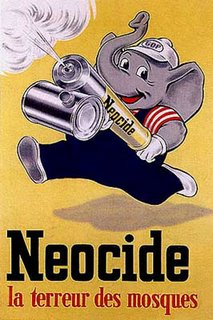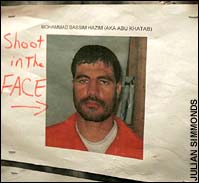
One of the advances in Bush's Iraq war logic is the beginnings of presenting a truthful and clear idea of who the enemy is. His war sppeched have too long relied on a murky and ill-defined jumbling of everyone who opposes the US into the grab-bag term of "terrorist."
Yet, I find it more than ironic--indeed it is tragic--that it has taken three years to define the enemy in this war. The most minimalist rational approach would seem to declare that you define the nemey first, before going to war. Otherwise you risk the irresponsible, and indiscriminate injury and killing of innocents. Indeed, this has been the result of this inability--probably the unwillingness--to define who it is exactly, the US is fighting.
Now, the sophistic response by Bush et al. will be that this war is "unlike any other war." I do not buy that argument and I believe the reasons provided for its justification are specious and bogus--if not outright decpetive.
Be that as it may, Bush et al's realization that he enemy actually has several faces, with differing agendas might prove helpful in getting out of Iraq as ASAP. That is, if the administration or the "loyal" opposition want to get out--something i believe is very much in question.
In general, US foreign policy will have to deal in the region for some time to come. In doing so, and in the interests of prosecuting the war "on terror" in a legitimate and effective way, policy-makers must continue to clarify and remain cognizant of who the enemy is. The most lucid--and I believe the most factual--account I have seen recently comes from Lebanese writer Rami G. Khouri, in his article, "Five Ideologies, One Middle East." Khouri writes:
1) Mainstream Islamists This is the largest single constituency in the region, comprising relatively moderate, mostly nonviolent, Islamist movements such as Hamas, Hezbollah and the Muslim Brotherhood. They use armed violence to repel foreign (mostly Israeli) occupations, and in the past sometimes violently challenged their own regimes in Syria, Egypt, Algeria and other lands. Most of them now focus on sharing or gaining political power peacefully, through local and national elections. Their significant gains in the ongoing Egyptian parliamentary elections are an important signal that they would fare well if free and fair elections were held in Arab countries.This is about as clear-eyed and perceptive as one could hope. Not only that, it has the virtue of coming from someone who's there on the ground and who undersatnds the cultural nuances of both the Arab world and the west.
2) Terrorist Groups A small number of Arabs, Pakistanis, Afghans and citizens of other lands have broken away from mainstream political Islamism and adopted terror as a vehicle for their political expression, a la Osama Bin Laden and Abu Musab Al Zarqawi. They draw on the same mass resentment and sense of marginalization that plague most Arab citizenries and feed the mainstream, nonviolent Islamist parties, but instead they use terror against Arab and foreign targets as an instrument of their political expression and aims.
3) American-led Western Hegemony This is the ideological force in the Middle East that has been recently articulated in more distinct terms, following the end of the Cold War around 1990 and then more emphatically after the attacks of 9/11. This movement aims to transform the Middle East into a series of Washington-compliant societies that are free to spend their money and run their internal affairs as they wish (e.g., family-run monarchies, tribal-run police states, security-run oligarchies, father-and-son kleptocracies) as long as they stay out of the business of terror, WMD proliferation and pestering Israel. Democracy is optional, and a free-market, globalized, free-trade economy preferred.
4) Anti-American, Anti-imperial Defiance This is the oldest running ideological current in the region, dating from a century ago when various Arabs rebelled against European, Ottoman and, to a limited extent, Zionist power in the region. Assad has now raised this banner high once again, targeting the U.S., and it will be important to see how many people follow his emotional and political lead. He couches his stance in pan-Arab and anti-imperial rhetoric and principles that still ring credibly to many ears in this battered region that suffers long-running Israeli, and more recent Anglo-American, military invasions and occupations.
5) Homegrown Arab Democracy And The Rule of Law This is the most recent and weakest ideology in the region, represented by civil society activists and others who demand more participatory, accountable Arab governance systems. This fledgling movement rears its head in important ways in many lands, by citizens who have grown weary and humiliated by their own national stagnation, autocracy, police states, corruption, mismanagement and deference to foreign dictates. They do not hold much hope for better things to come from the four other primary ideological forces swirling around them, and work instead for governance that respects the rule of law and pluralism. In terms of political anthropology, they are like algae that starts to grow slowly, in small clusters in dark corners, but has the potential to take root and ultimately overwhelm its immediate environment.
Take a gander at this article and let it sink in. There's a lot there for people who want to remake the world and build nations. Such an endeavor, so as not to repeat the mistakes of empires past, must understand not who one's enemy is, but also who one's friend is.

12/4: A more sinister aspect of what has happened in Iraq in reference to ethnicity there, is the following article, which suggests that once the US leaves, there will be ethnic cleansing on a level suggested by Rwanda or Serbo-Croatia. What hath we wrought indeed. "Bush in Iraq, Slouching Toward Genocide," By Robert Parry
Update 12/03/05 US Army admits Iraqis outnumber foreign fighters as its main enemy by Toby Harnden in Ramadi






No comments:
Post a Comment